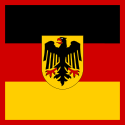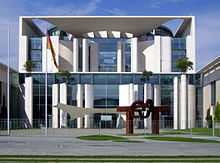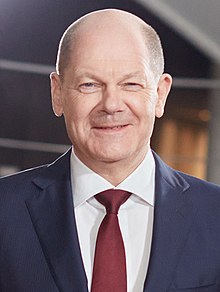Chancellor of Germany
offices held over time by the head of government of Germany
(Redirected from Chancellor of Germany (Federal Republic))
The chancellor of Germany (German: Bundeskanzler, literally: federal chancellor) is the head of government of the Federal Republic of Germany. The Chancellor of Germany is elected by the majority of the members of the Bundestag, the German parliament. The chancellor is the German people's version of a Prime Minister or Premier.
| Federal Chancellor of the Federal Republic of Germany
Bundeskanzlerin der Bundesrepublik Deutschland | |
|---|---|
 | |
 Standard of the Chancellor | |
| Executive branch of the Government | |
| Style | Mr. Chancellor (informal) His Excellency (diplomatic)[1] |
| Status | Head of Government |
| Member of | Federal Cabinet European Council |
| Seat | Federal Chancellery, Berlin (main seat) Palais Schaumburg, Bonn (second seat) |
| Nominator | Bundestag |
| Appointer | President of Germany |
| Term length | 4 years, renewable |
| Constituting instrument | German Basic Law (German Constitution) |
| Inaugural holder | Konrad Adenauer |
| Formation | 24 May 1949 |
| Deputy | Vice-Chancellor of Germany |
| Salary | €351,552 annually[2] |
| Website | bundeskanzlerin |

The current chancellor is Olaf Scholz (SPD) since 8 December 2021.
Chancellors since 1949
change- Konrad Adenauer (CDU), 1949–1963
- Ludwig Erhard (CDU), 1963–1966
- Kurt Georg Kiesinger (CDU), 1966–1969
- Willy Brandt (SPD), 1969–1974
- Helmut Schmidt (SPD), 1974–1982
- Helmut Kohl (CDU), 1982–1998
- Gerhard Schröder (SPD), 1998–2005
- Angela Merkel (CDU), 2005–2021
- Olaf Scholz (SPD), since 2021
Related pages
change- List of chancellors of Germany
- Reich Chancellor, chancellors of the German Reich
References
change- ↑ "Ratgeber für Anschriften und Anreden" (PDF). Bundesministerium des Innern – Protokoll Inland. p. 40. Retrieved 23 May 2019.
- ↑ "Wie hoch ist das Gehalt von Angela Merkel?". handelsblatt.com.
Wikimedia Commons has media related to Bundeskanzler (Deutschland).
